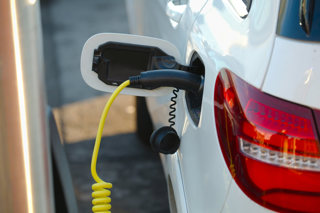The following article was published in the September 24 issue of Fleet News. Read the full article.
Two challenges head the myriad issues facing fleet operators over the coming months: uptake of electric vehicles (EVs) and the fallout from Covid-19.
Dig deeper and the real diversity in fleet becomes evident. Some businesses are confronting personal challenges as they take action to address individual priorities, while others are consumed by the holistic challenges affecting every company across the country. No matter the size of fleet, everyone has something to occupy their time.
EVs are omnipresent. For a range of reasons, companies are focusing on shifting their fleets from diesel to full electric or plug-in hybrids. Supply is a concern for many, some are juggling complications in setting up a workplace charging infrastructure, while others still can’t quite make the sums add up for certain wholelife cost comparisons.
Three-quarters of the 68 Fleet200 fleets that provided details of their challenges for the year ahead pointed to EVs. And those challenges intensify for companies looking to convert their van fleets where choices are fewer and range is less viable – particularly when, like Centrica, they are striving to comply with Government legislation as well as meet internal business ambitions.
As one of the partners in the three-year Optimise Prime initiative, Centrica is committed to transitioning its fleet. In July, it placed an order for 1,000 e-Vivaro medium panel vans from Vauxhall which will be introduced over the coming 12 months.
 “We’re trying to get up the EV ladder quite quickly. We’ve operated EVs since 2014 and our total cost of ownership (TCO) modelling says we can move to them as soon as the vehicles are readily available,” says Steve Winter (left), Centrica head of fleet.
“We’re trying to get up the EV ladder quite quickly. We’ve operated EVs since 2014 and our total cost of ownership (TCO) modelling says we can move to them as soon as the vehicles are readily available,” says Steve Winter (left), Centrica head of fleet.
“Because we’re looking at charge points now, we should be able to switch as soon as we can get available product.”
Bizarrely, Centrica faced some negative publicity on social media following the announcement of the Vauxhall deal, with some claiming the company would monopolise supply of the electric vans, shutting the door to them. However, Centrica is a trailblazer for EV; it’s been the early adopter when others were reluctant to take the plunge, while the profile of its fleet with a high proportion of urban mileage is ideal for the technology.
Nevertheless, supply is an issue, and one which fleets are urging manufacturers to address.
Galliford Try, Countrywide, Panasonic and Defra are among those fearing a shortage of electric vehicle supply, although some fleets, including AT&T, Rhodar and Xerox, worry about access to replacement vehicles irrespective of fuel type, due to the knock-on from production shutdowns during coronavirus and uncertainty about what happens in a post-Brexit trade deal.
Z-Tech Control Systems commercial director Luke Stanbridge is one of those concerned about “delays in delivery due to Covid-19 – this is both to replace vehicles which are past our current operating age, and additions during growth”.
Stanbridge has sign off to introduce a new fleet policy. “We are going to move over to a pure electric car option policy for director, manager level 1 and 2, with a cash alternative,” he says. “All level 3s have one car choice, a 1.0 Ford Focus.”
Supply is not the only issue for fleet operators looking to increase their EV numbers. Delivery operator DPD, which has taken on more than 700 electric vans this year, also highlights concerns about costs for electric cars.
Ray Govier, DPD fleet operations manager, says: “With regard to company cars, the lease rates for PHEV/BEV are much greater than their petrol or diesel equivalents and, as such, the choice for a user is limited compared with an internal combustion engine (ICE) alternative. The industry needs to ensure that the residual values (RVs) for these cars are realistic and thus bring the lease cost down, then more drivers will choose them.”
Speedy Asset Services is also struggling to get plug-in hybrid or full electric vehicles into the right company car bands, with a lack of options between £35,000 in one of its grades.
Its ordeal is recognised by Altrad Services. Head of fleet Matthew Hammond agrees that electrification is “the biggest challenge”, adding: “The drive and push to reduce our dependency on ICE vehicles is limited by the lack of available options, costs and infrastructure issues.”
Decision-makers in charge of the UK’s biggest fleets are keen to be given greater insight by manufacturers into their model production plans to enable them to start preparing the transition to electric.
 However, clarity from Government policymakers is also essential, according to SSE head of fleet Simon Gray (left).
However, clarity from Government policymakers is also essential, according to SSE head of fleet Simon Gray (left).
“Availability of insight into what we can expect manufacturers to develop in the commercial vehicle product line will enable planning for the transition to alternative fuels is a big challenge,” Gray says, “and what strategic policy will develop from Government on charging infrastructure outside of mainstream locations.”
Murphy Plant fleet manager Tony Murphy added his own concerns: “For commercial vehicles, plug-in hybrids do not really work in the civil engineering sector yet the Government is still going ahead with ceasing the sales of new petrol and diesel vehicles from 2040 – if not sooner.”
Howdens Joinery is already setting out robust plans to convert its fleet across to alternative vehicles and is taking early action in partnership with its leasing provider to pre-empt any predicted fall in RVs for diesel.
Chris Woolfenden, Howdens head of trade operational IS and support, explains: “We are in discussion with our lease provider to agree early terminations of as many vehicles as possible and place orders for hybrid, plug-in hybrid and EVs. Rationale is that auction value of diesels will drastically fall over the one, two and three years left on our leases. The plan is that we can come together with our leasing company limiting losses by selling now and with us, the customer, benefiting from new vehicles with lower wholelife costs and huge BIK benefits for our employees.”
Kings Secure Technologies is confident 2021 will be the year it adds EVs to its fleet.
 The challenges, according to fleet and logistics manager Jacob Telemacque (left), include: selecting the right vehicle, ensuring the infrastructure is sufficient to meet its operating conditions, educating drivers – “getting them to change their driving style to get the best out of EVs” – and ensuring drivers can plan their journeys.
The challenges, according to fleet and logistics manager Jacob Telemacque (left), include: selecting the right vehicle, ensuring the infrastructure is sufficient to meet its operating conditions, educating drivers – “getting them to change their driving style to get the best out of EVs” – and ensuring drivers can plan their journeys.
He is also mindful of working to find solutions for employees without driveways being able to access charging and having a clear process for replacement EVs if one is off the road.
Overall, Telemacque says, there must be “financial benefits to the business”, rather than a cost.
UK Power Networks is rewriting its fleet policy to allow the integration of electric vehicles to “best advantage company and drivers”.
The includes reviewing funding options to best utilise purchase of EVs and changing the budgeting model to match the new criteria with electric
vehicles’ upfront cost versus wholelife cost, says fleet manager Ricki Sayer.
Evolving fleet policy
For Coca-Cola, communication with employees will be essential to engage them with an evolving fleet policy in the transition to a lower carbon fleet.
EVs are “the ultimate aim”, says fleet manager Steven Pope, but it isn’t suitable for all drivers or job functions. He’ll be looking at how hybrid can fill the gaps and give the company the “correct fuel mix on fleet in the short- and medium-term without removing the flexibility to further adopt EVs where possible”.
Coronavirus is casting a dark cloud across the UK economy with rising debt and worries about jobs. It was highly disruptive for many companies during lockdown, with company cars sitting idle on driveways while essential services fleets were sometimes pushed close to breaking as they sought to handle mounting levels of demand for services.
No surprise, then, with no end in sight to the pandemic, that it remains high on the agenda for fleet decision-makers.
Social distancing in vehicles which traditionally carried multiple people is vexing Kier, among others, potentially resulting in more vehicles on the road with sole occupants and a subsequent knock-on for fuel costs. Kier Group head of fleet Julie Madoui also recognises the need to introduce a range of mobility solutions for employees who no longer want a company car due to the reduction in commuting mileage.
Interserve also anticipates a surge in interest in cash rather than company car, while Thales raises the prospect of the closure of dealers and manufacturers – already starting with Mitsubishi’s announcement of its exit from Europe – which could reduce choice and levels of support.
Aviva is already seeing issues with parts supply for some brands.
Supply chains affected
Sean Clifton, Adsa senior manager national fleets, focuses on the changing landscape affecting business.
“Customer demands have changed and are likely to be different when we come out of the situation,” he says. “Supply chains have been significantly affected, meaning reduced certainty of product either for resale or for use in the running the business.”
At a more immediate and practical level, Kelly Group has been dealing with having 900 vehicles off the road and getting staff back working again.
West Yorkshire Police, meanwhile, is already planning implementing disaster planning with the conversion of its transport building to ensure that social distancing can become the normal practice for future years and protect the organisation and its employees against further pandemics.
Despite the new fuel and emissions testing procedure being introduced as the CO2 measurement for BIK on all cars five months ago, while all new vans registrations have been subject to the test since September 2019, WLTP remains a worry for some fleets.
Few go into detail, although ABM fleet manager Denise Hawkins is looking closely at the implications of the new testing results on car drivers’ tax liabilities.
However, for SCC, the issue has been and gone. Fleet manager Steve Deeley says: “Biggest challenge was WLTP and making cars fit to budget; now it’s how to recover from Covid-19 and all the implications this will lead to.”
Away from the holistic, economic and big-ticket topics are a number of more individualistic challenges facing fleet decision-makers.
Improve driver training
Millers Vanguard is looking to improve its driver training to continually reduce claim frequency, while high on LKQ Euro Car Parts’ agenda is a reduction in service, maintenance and repair budgets as part of a universal reduction in fleet costs.
Kelly Group is redesigning its management training as it has more personnel in charge of vehicles that tow and more HGV drivers.
JLA is targeting a reduction in insurance premiums, while BCA and Genus are both expecting to adjust or re-write their fleet policies.
Two companies are seeing a reduction in resource.
For Clarion Response fleet and environmental manager Colin Hutt, it’s about managing the fleet with less administration support, while E.On no longer has a fleet manager after the departure of Ellie Barnes, senior contract manager – UK fleet, in June.
E.On is now restructuring its national fleet to move management responsibility into individual business units, rather than being controlled centrally. Contract and supplier management will be a head office function, but day-to-day operations will move to business level.























Login to comment
Comments
No comments have been made yet.